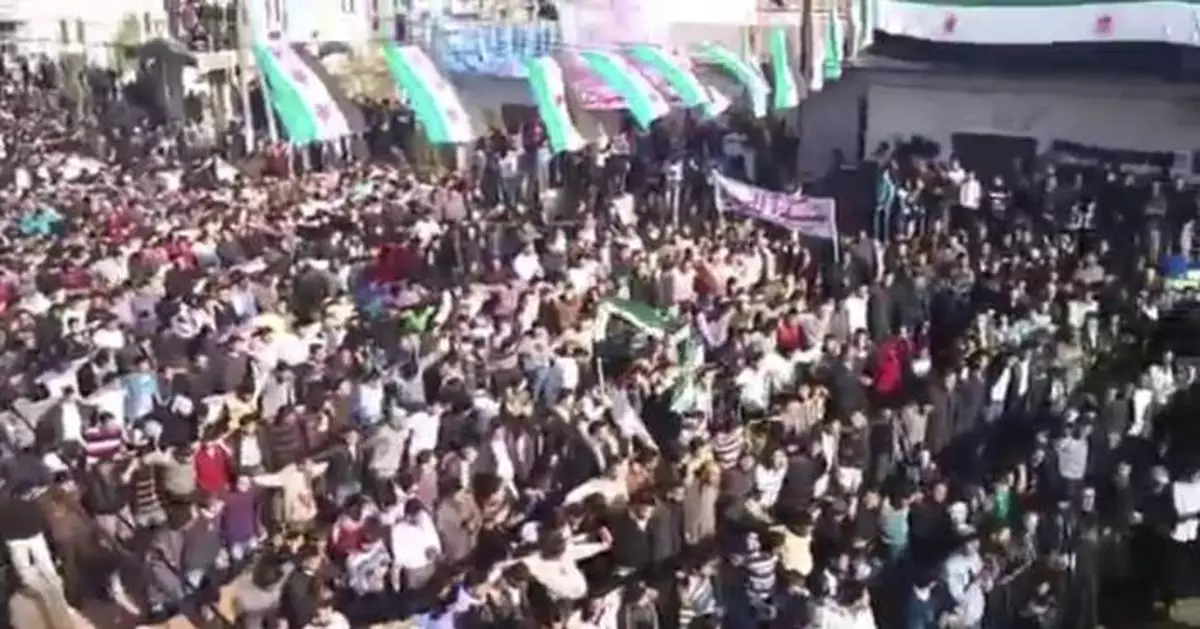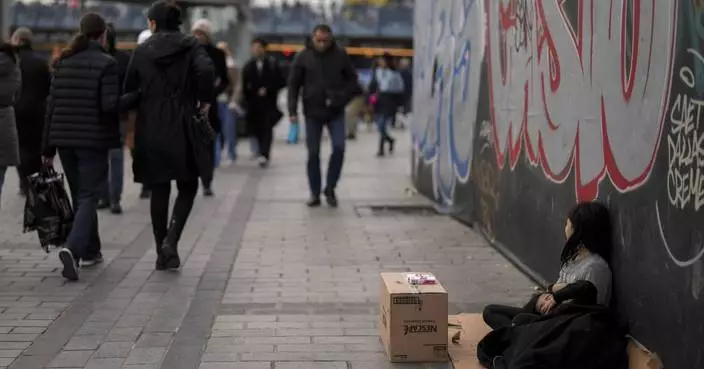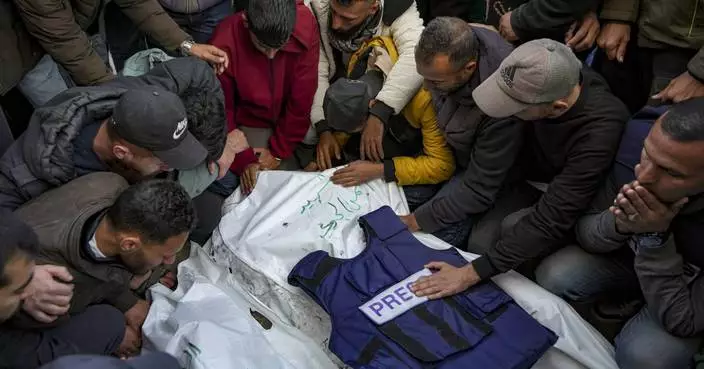BEIRUT (AP) — It was one of the darkest moments in the modern history of the Arab world. More than four decades ago, Hafez Assad, then president of Syria, launched what came to be known as the Hama Massacre.
Between 10,000 to 40,000 people were killed or disappeared in the government attack on the central Syrian city. It began on Feb. 2, 1982, and lasted for nearly a month, leaving the city in ruins.
The memory of the government assault and the monthlong siege on the city, which at the time was a stronghold of Syria’s Muslim Brotherhood, remains visceral in Syrian and Arab minds.
Now Islamist insurgents have captured the city, tearing down a poster of Hafez Assad’s son, President Bashar Assad, and swarming security and government offices — scenes unimaginable 40 years ago.
The moment carried great symbolism in Syria’s long-running civil war, which began 13 years ago but many say is rooted in Hama.
Hama, Syria’s fourth-largest city, is known for its quaint waterwheels, a landmark attraction along the banks of the Orontes River.
In the early 1980s, the city's name became synonymous with killings.
It was the scene of Muslim Brotherhood-led anti-government attacks that targeted military officers, state institutions and ruling party offices. In February 1982, Hafez Assad ordered an assault on the city to quell the unrest.
In a matter of days, government warplanes destroyed most of the city, opening the way for ground troops.
Hafez Assad’s brother, Rifaat, led the artillery unit that shelled the city and killed thousands, earning him the nickname the “Butcher of Hama.”
Only this year, Rifaat Assad was indicted in Switzerland for war crimes and crimes against humanity in connection with Hama. An international arrest warrant was issued for him three years earlier.
The massacre created resentment that fanned the flames of another uprising against his son years later.
In 2011, Hama and surrounding towns became the epicenter of some of the biggest protests against Bashar Assad, which started in 2011 during a wave of Arab uprisings.
The protests forced government security forces to withdraw from the city briefly in June 2012, leaving the opposition in control and fueling a brief sense of liberation, in a place that had once been pounded by Syrian warplanes.
Residents at that time painted walls around the city in red, threw red paint on the waterwheels to symbolize the Hama massacre and tried to organize local administration. About 800,000 people lived there at the start of the uprising.
“Erhal ya Bashar," a protest chant that means “Come on, leave, Bashar” was popularized in the Hama protests.
But government forces returned in August of that year, with a brutal assault that caused mass casualties in the first 24 hours. The leader of the chants was later killed, his throat slit by government forces.
Aron Lund, a longtime Syria expert at Century International, a New York-based think tank, said Hama has obvious symbolic value because of the history of the massacre. He described it as a “huge event in Syrian history and really formative for the opposition and the Islamist opposition in particular."
The brutal crackdown is commerated each year.
It was also formative for government forces, because many of the current military leaders were young at the time, Lund said.
“When 2011 rolled around, they all realized that, you know, we all remember, you all remember Hama. So there’s no there’s no compromising here,” he said.
In a video message Thursday, Abu Mohammed al-Golani, the de facto leader of the Syrian insurgency, announced that fighters had reached Hama “to clean the wound that has bled for 40 years.” One of the opposition fighters' first moves was to free prisoners from the city's central prison.
Hama is a major intersection in Syria that links the country’s center with the north as well as the east and the coast.
It is about 200 kilometers (125 miles) north of the capital, Damascus, Assad’s seat of power. Hama province also borders the coastal province of Latakia, a main base of popular support for Assad.
The region is predominantly Sunni Muslim but also has a minority from the Alawite sect, an offshoot of Shiite Islam, to which Assad’s family belongs.
Hama’s fall would have been a massive development in its own right, Lund said. But coming after the fall of Syria’s largest city, Aleppo last week, which gave government forces the time to prepare their defense lines, it “will absolutely encourage Assad’s enemies and discourage his supporters.”
Next stop for the insurgents is the central province of Homs, which analysts say would be a game-changer if it falls into rebel hands. Insurgent groups have already said they are advancing toward Homs.
Homs, about 40 kilometers (25 miles) south of Hama, is where one of Syria's two state-run oil refineries is located and is also gateway to Damascus. It connects the capital to the coast, where Assad has his base and his village of origin, and home to a Russian naval base.
“Should the rebels be able to seize Homs, which they now have a shot at doing after seizing Hama, then they could theoretically have grabbed" three of Syria's largest cities and severed the capital from the coast, said Lund.
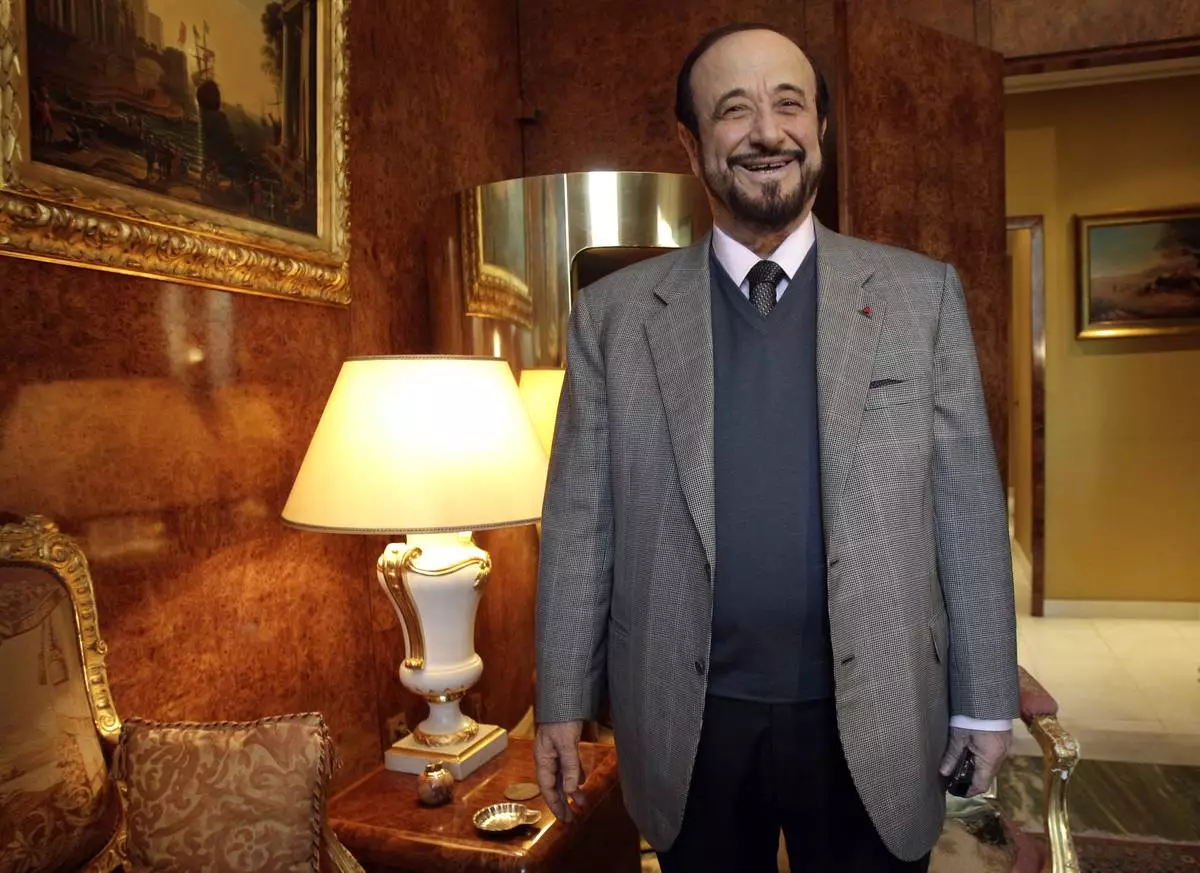
FILE - Rifaat Assad, an exiled uncle of Syrian president Bashar Assad answers questions from the Associated Press, in Paris, France, Tuesday Nov.15, 2011. (AP Photo/Michel Euler, File)
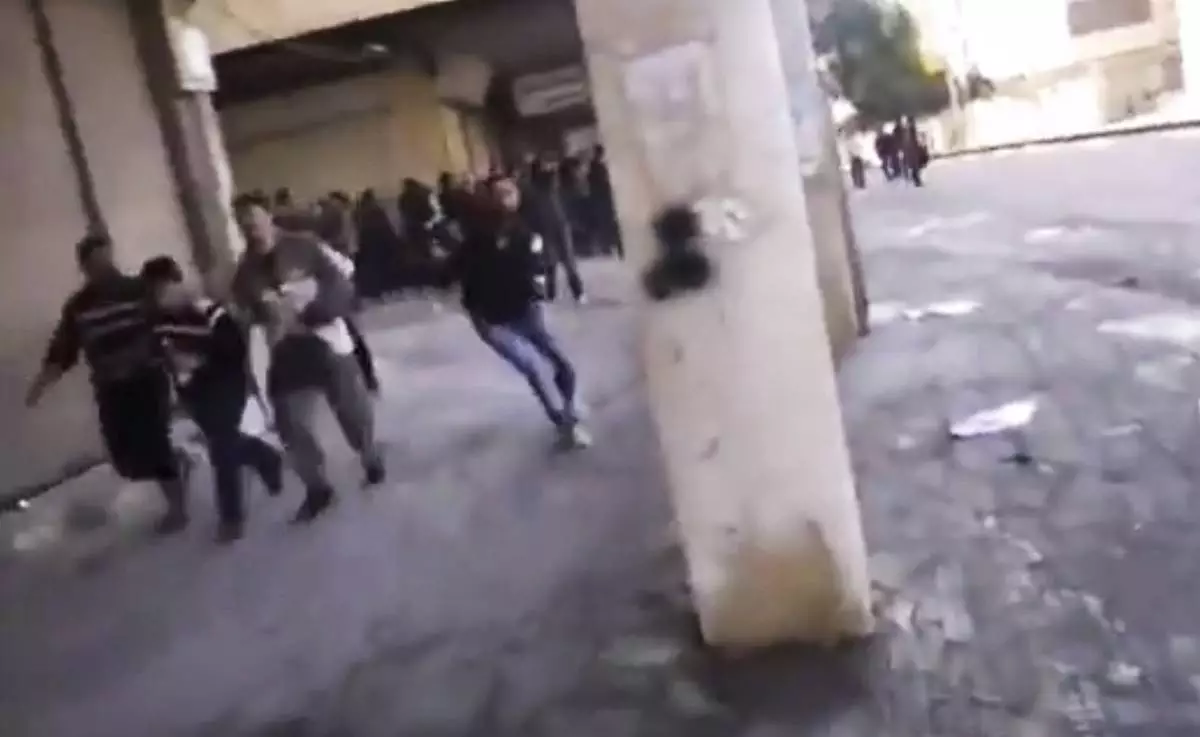
FILE - This image from amateur video made available by Ugarit News Group purports to shows Syrian protesters running from gunfire in Hama, Syria, Wednesday, Dec. 28, 2011. (AP Photo/Ugarit News Group via APTN, File)
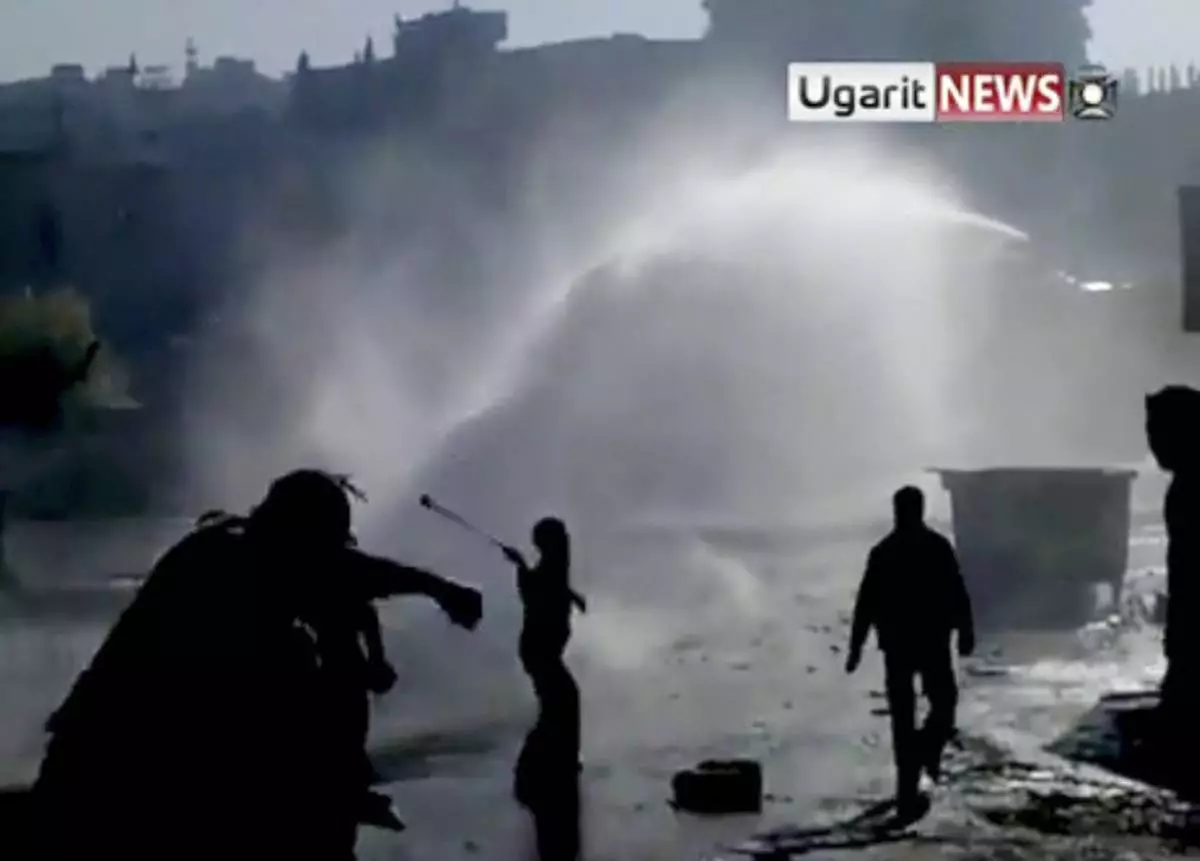
FILE - In this image made from amateur video accessed Wednesday Dec. 28, 2011 and released by Ugarit, purports to show protesters reacting to a water cannon in Hama, Syria. (AP Photo/Shaam News Network via APTN, File)

FILE - In this image from amateur video made available by the Ugarit News group and shot on Friday, Dec. 30, 2011, protesters gather at an anti-Syrian president Bashar Assad rally in Hama, Syria. (AP Photo/Ugarit News Group via APTN, File)
DEIR AL-BALAH, Gaza Strip (AP) — Houthi rebels in Yemen said Israeli airstrikes on Thursday targeted the rebel-held capital of Sanaa and the port city of Hodeida, following several days of Houthi launches setting off sirens in Israel.
The Israeli military said it attacked infrastructure used by the Houthis at the international airport in Sanaa and ports at Hodeida, Al-Salif and Ras Qantib along with power stations. It came a day after Israeli Prime Minister Benjamin Netanyahu said that “the Houthis, too, will learn what Hamas and Hezbollah and Assad’s regime and others learned.”
Netanyahu monitored the new strikes along with military leaders, his government said. The Iran-backed Houthis' media outlet confirmed the strikes in a Telegram post but gave no immediate details. The U.S. military also has targeted the Houthis in Yemen in recent days. The United Nations has noted that the ports are important entryways for humanitarian aid.
Over the weekend, 16 people were wounded when a Houthi missile hit a playground in Tel Aviv. Last week, Israeli jets struck Sanaa and Hodeida, killing nine people, calling it a response to previous Houthi attacks. The Houthis also have been targeting shipping on the Red Sea corridor, calling it solidarity with Palestinians in Gaza.
Meanwhile, an Israeli strike killed five Palestinian journalists outside a hospital in the Gaza Strip overnight, the territory's Health Ministry said. The Israeli military said that all were militants posing as reporters.
The strike hit a car outside Al-Awda Hospital in the built-up Nuseirat refugee camp in central Gaza. The journalists were working for the local news outlet Al-Quds Today, a television channel affiliated with the Islamic Jihad militant group.
Islamic Jihad is a smaller and more extreme ally of Hamas and took part in the Oct. 7, 2023 attack in southern Israel, which ignited the war. The Israeli military identified four of the men as combat propagandists and said that intelligence, including a list of Islamic Jihad operatives found by soldiers in Gaza, had confirmed that all five were affiliated with the group.
Hamas, Islamic Jihad and other Palestinian militant groups operate political, media and charitable operations in addition to their armed wings.
Associated Press footage showed the incinerated shell of a van, with press markings visible on the back doors. Sobbing young men attended the funeral outside the hospital. The bodies were wrapped in shrouds, with blue press vests draped over them.
The Committee to Protect Journalists says that more than 130 Palestinian reporters have been killed since the start of the war. Israel hasn't allowed foreign reporters to enter Gaza except on military embeds.
Israel has banned the pan-Arab Al Jazeera network and accused six of its Gaza reporters of being militants. The Qatar-based broadcaster denies the allegations and accuses Israel of trying to silence its war coverage, which has focused heavily on civilian casualties from Israeli military operations.
Separately, Israel's military said that a 35-year-old reserve soldier was killed during fighting in central Gaza early Thursday. A total of 389 soldiers have been killed in Gaza since the start of the ground operation more than a year ago.
The war began when Hamas-led militants stormed across the border in an attack on nearby army bases and farming communities. They killed around 1,200 people, mostly civilians, and abducted around 250. About 100 hostages are still inside Gaza, at least a third believed to be dead.
Israel's air and ground offensive has killed more than 45,000 Palestinians, according to the Health Ministry. It says more than half the fatalities have been women and children, but doesn't say how many of the dead were fighters. Israel says it has killed more than 17,000 militants, without providing evidence.
The offensive has caused widespread destruction and driven around 90% of the population of 2.3 million from their homes. Hundreds of thousands are packed into squalid tent camps along the coast, with little protection from the cold, wet winter.
Also Thursday, people mourned eight Palestinians killed by Israeli military operations in and around the city of Tulkarem in the occupied West Bank on Tuesday, according to the Palestinian Health Ministry. The Israeli military said that it opened fire after militants attacked soldiers, and it was aware of uninvolved civilians who were harmed in the raid.
A previous version of this story was corrected to show that the name of the local news outlet is Al-Quds Today, not the Quds News Network.
Follow AP’s war coverage at https://apnews.com/hub/israel-hamas-war
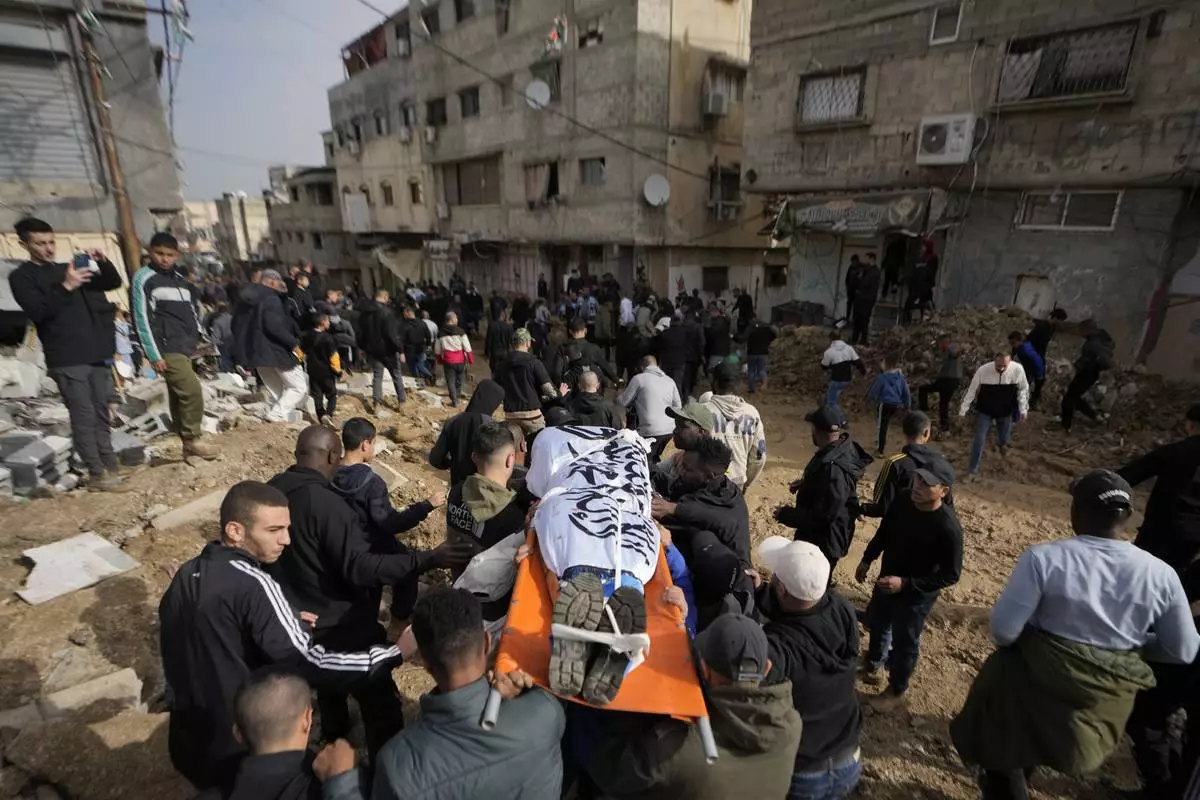
Mourners carry the bodies of eight killed Palestinians, some are wrapped with the Islamic Jihad flag, during their funeral following the withdrawal of the Israeli army, in the West Bank city of Tulkarem, Thursday, Dec. 26, 2024. (AP Photo/Matias Delacroix)
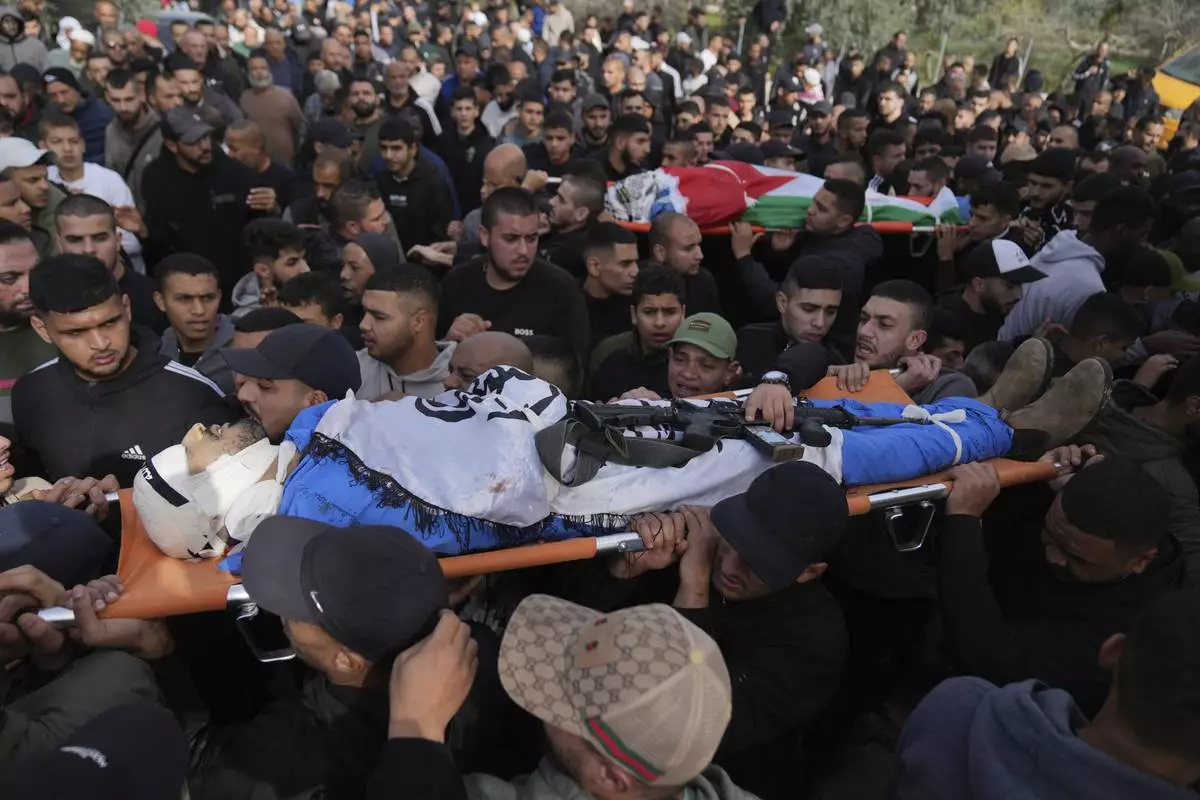
Mourners carry the bodies of killed Palestinians, some wrapped with the Islamic Jihad flag, during their funeral following the withdrawal of the Israeli army, in the West Bank city of Tulkarem, Thursday, Dec. 26, 2024. (AP Photo/Nasser Nasser)

A boy walks along of a damaged street after the latest Israeli military operation, in the West Bank city of Tulkarem, Thursday, Dec. 26, 2024. (AP Photo/Matias Delacroix)
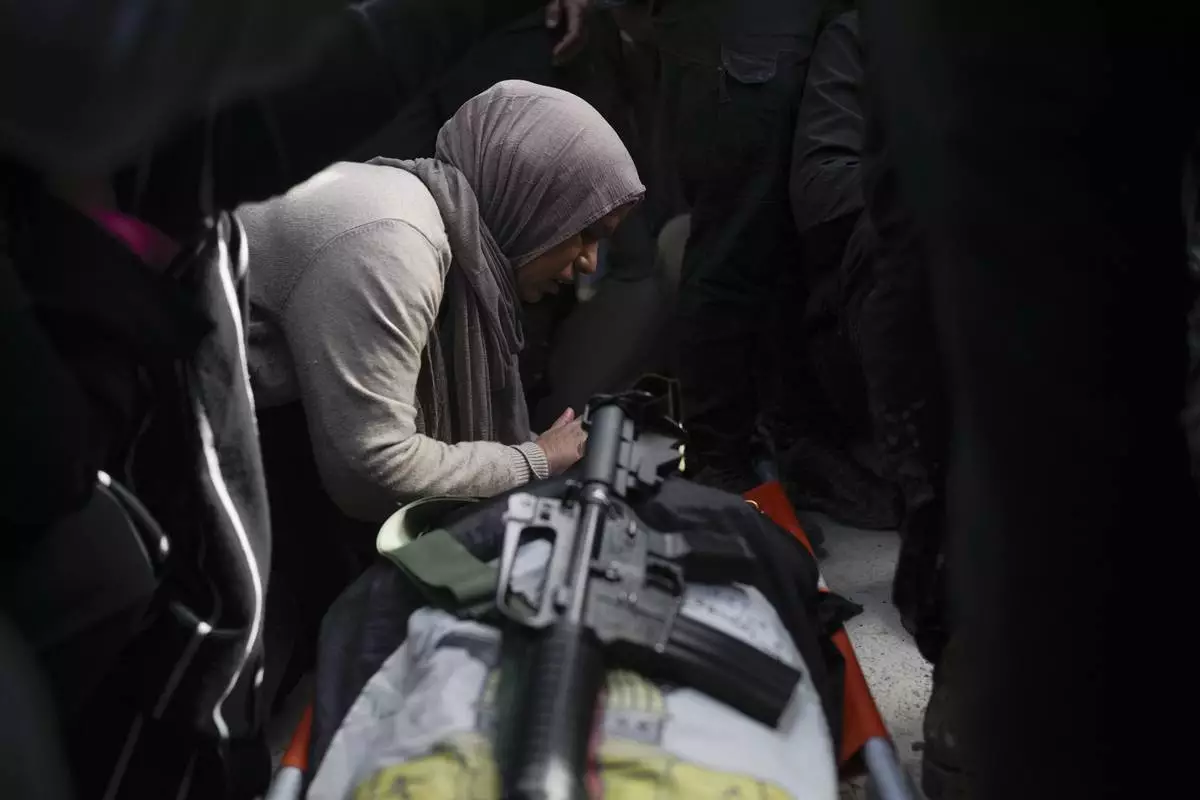
A mourner cries while she takes the last look at the body of a relative, one of eight Palestinians killed, during their funeral following the withdrawal of the Israeli army, in the West Bank city of Tulkarem, Thursday, Dec. 26, 2024. (AP Photo/Matias Delacroix)
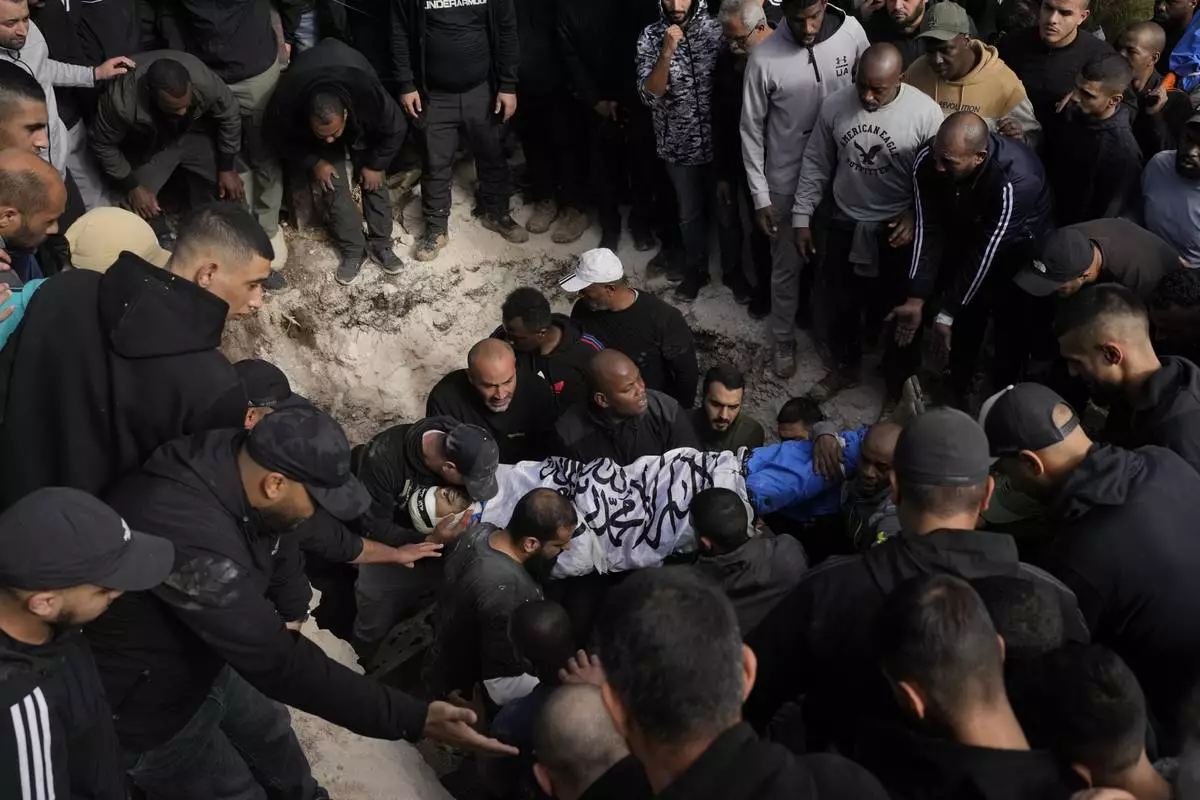
A Palestinian killed during an Israeli army operation is buried in the West Bank city of Tulkarem, Thursday, Dec. 26, 2024. (AP Photo/Matias Delacroix)
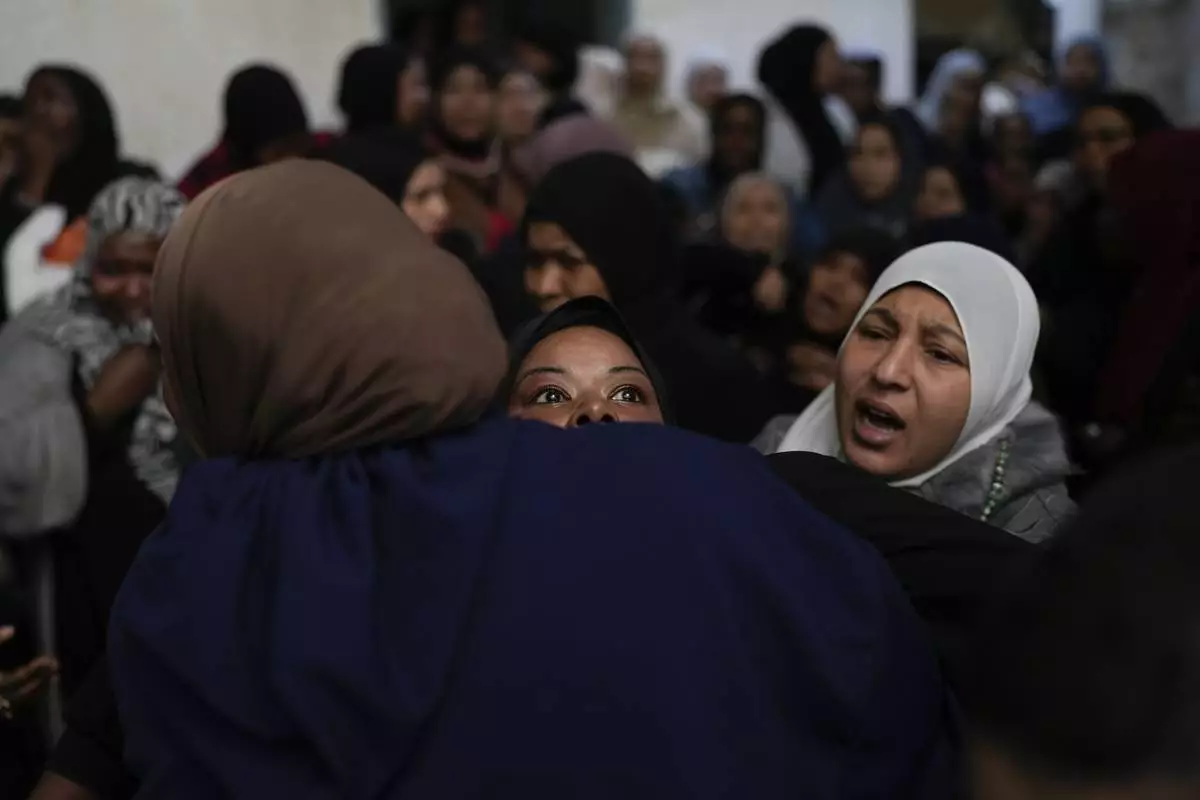
A mourner cries after taking a last look at the body of a relative, one of eight Palestinians killed, during their funeral following the withdrawal of the Israeli army, in the West Bank city of Tulkarem, Thursday, Dec. 26, 2024. (AP Photo/Matias Delacroix)
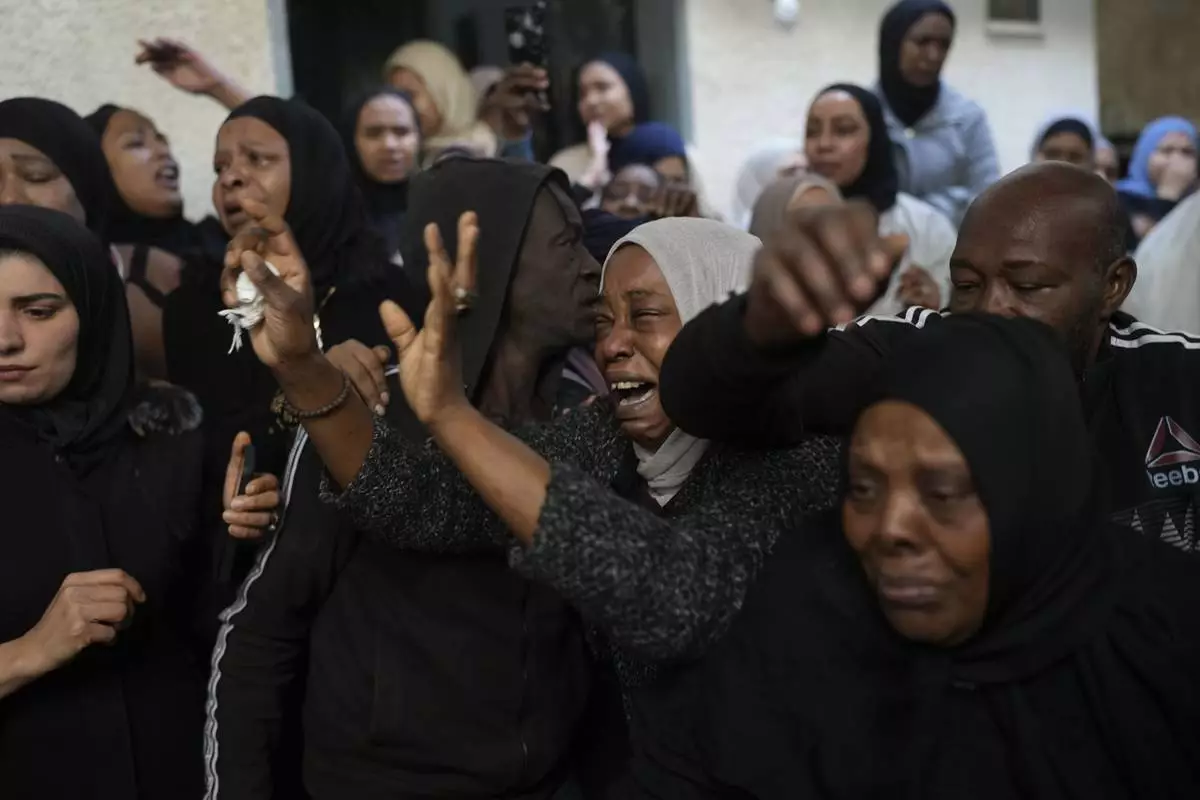
Mourners cry while they take the last look at the body of a relative, one of eight Palestinians killed, during their funeral following the withdrawal of the Israeli army, in the West Bank city of Tulkarem, Thursday, Dec. 26, 2024. (AP Photo/Matias Delacroix)
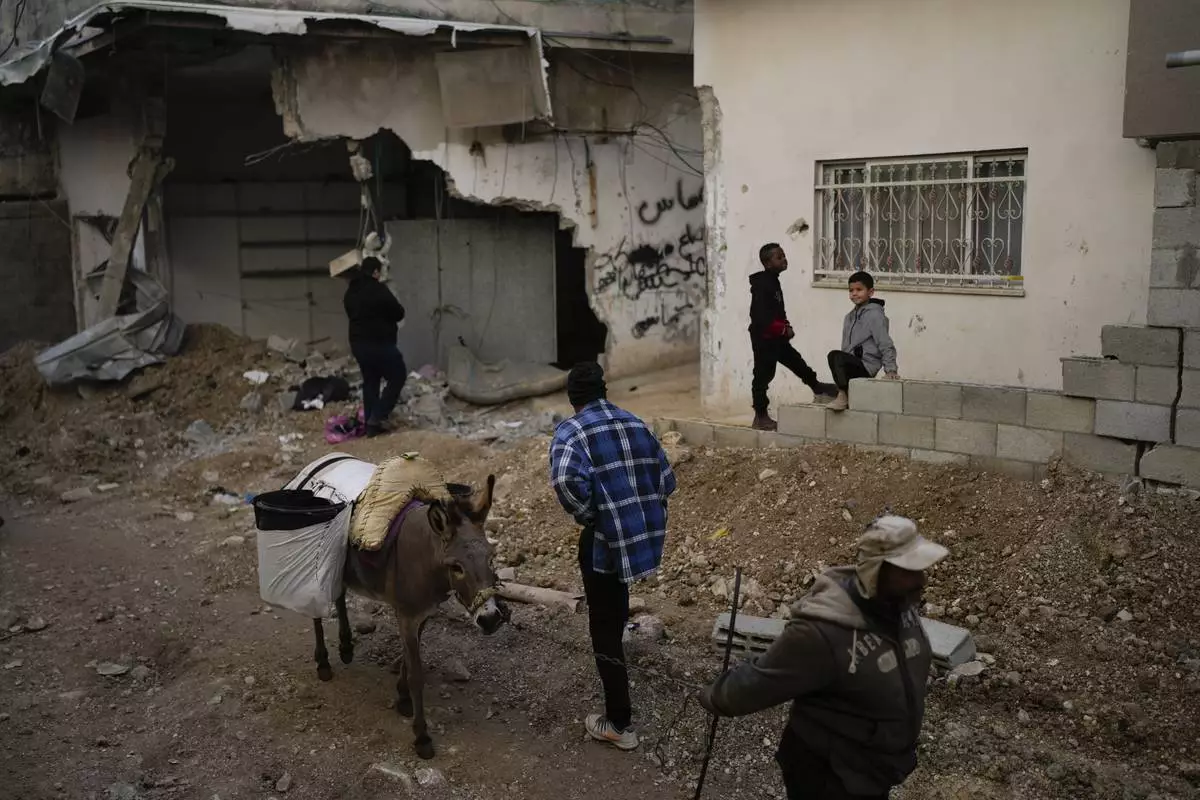
Locals stand next to a damaged building after the latest Israeli military operation, in the West Bank city of Tulkarem, Thursday, Dec. 26, 2024. (AP Photo/Matias Delacroix)
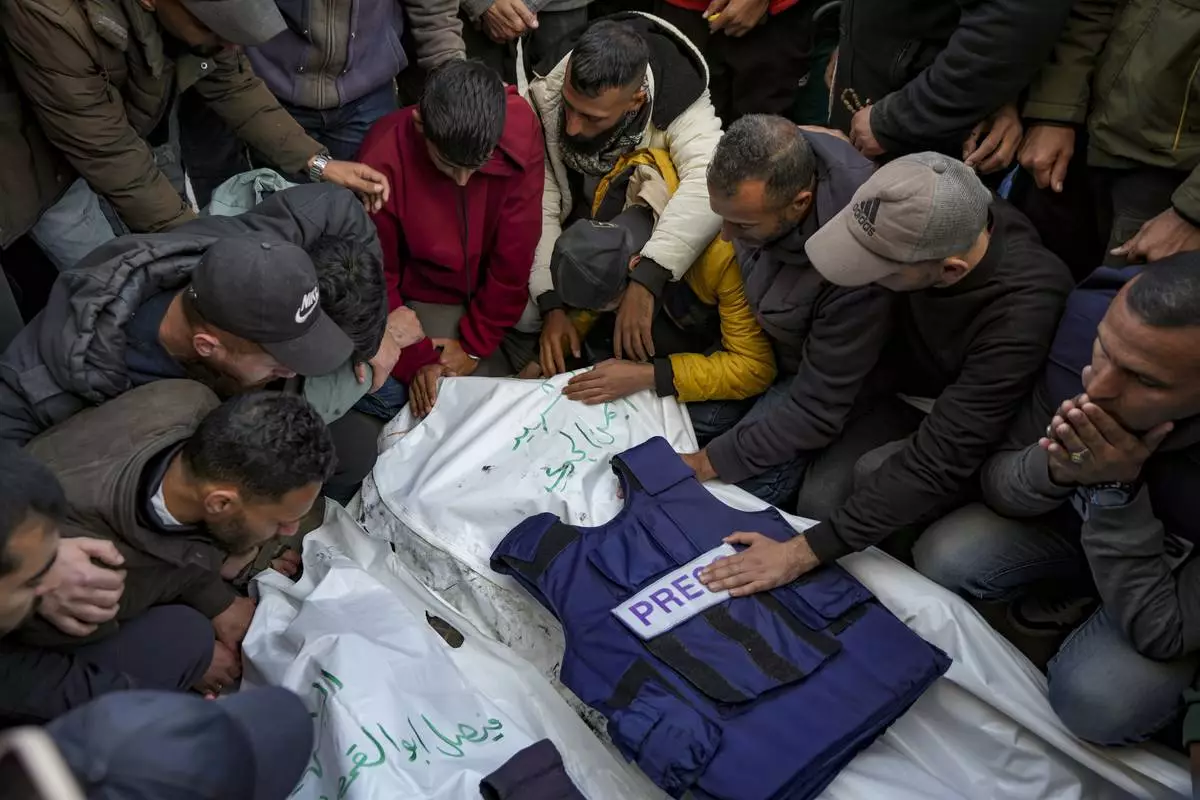
Relatives and friends mourn over the bodies of five Palestinian journalists who were killed by an Israeli airstrike in Gaza City at the Al-Aqsa Hospital in Deir al-Balah, Thursday, Dec. 26, 2024. (AP Photo/Abdel Kareem Hana)
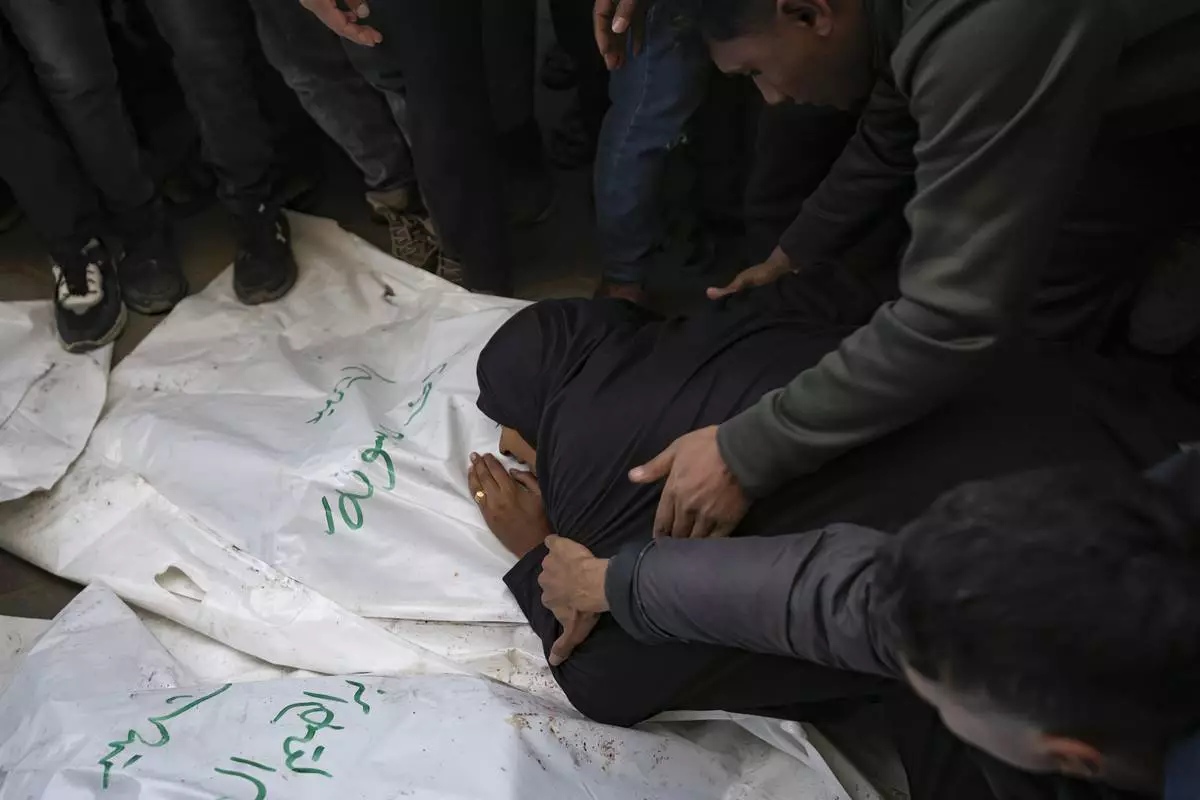
A relative mourns over the body of one of the five Palestinian journalists who were killed by an Israeli airstrike in Gaza City at the Al-Aqsa Hospital in Deir al-Balah, Thursday, Dec. 26, 2024. (AP Photo/Abdel Kareem Hana)
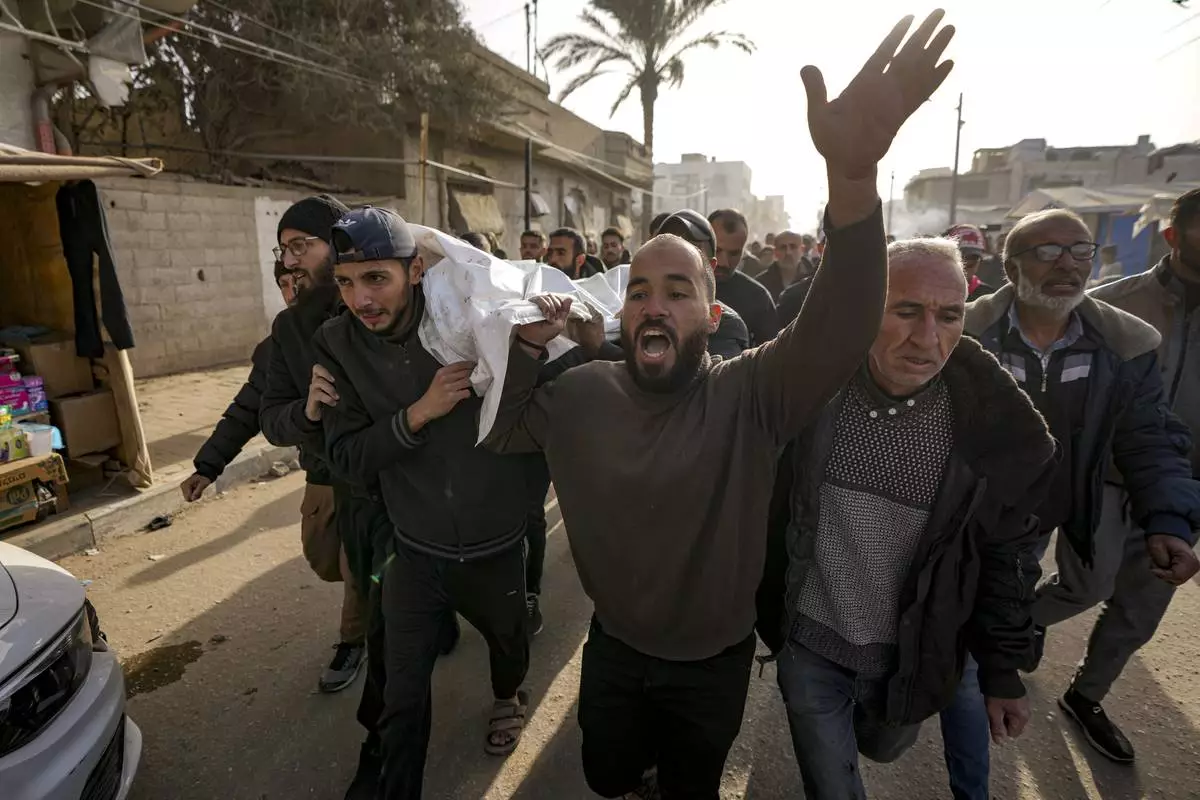
Mourners react as they carry the bodies of five Palestinian journalists who were killed by an Israeli airstrike in Gaza City at the Al-Aqsa Hospital in Deir al-Balah, Thursday, Dec. 26, 2024. (AP Photo/Abdel Kareem Hana)
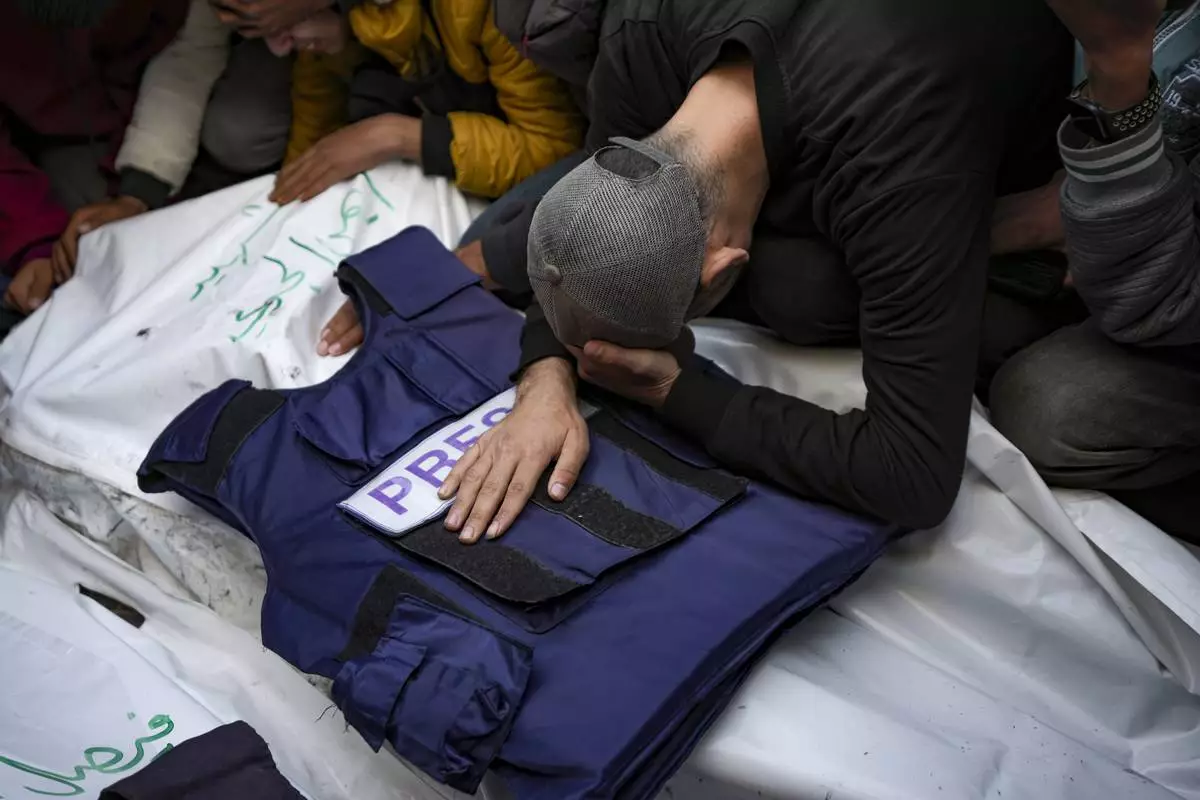
A relative mourns over the body of one of the five Palestinian journalists who were killed by an Israeli airstrike in Gaza City at the Al-Aqsa Hospital in Deir al-Balah, Thursday, Dec. 26, 2024. (AP Photo/Abdel Kareem Hana)
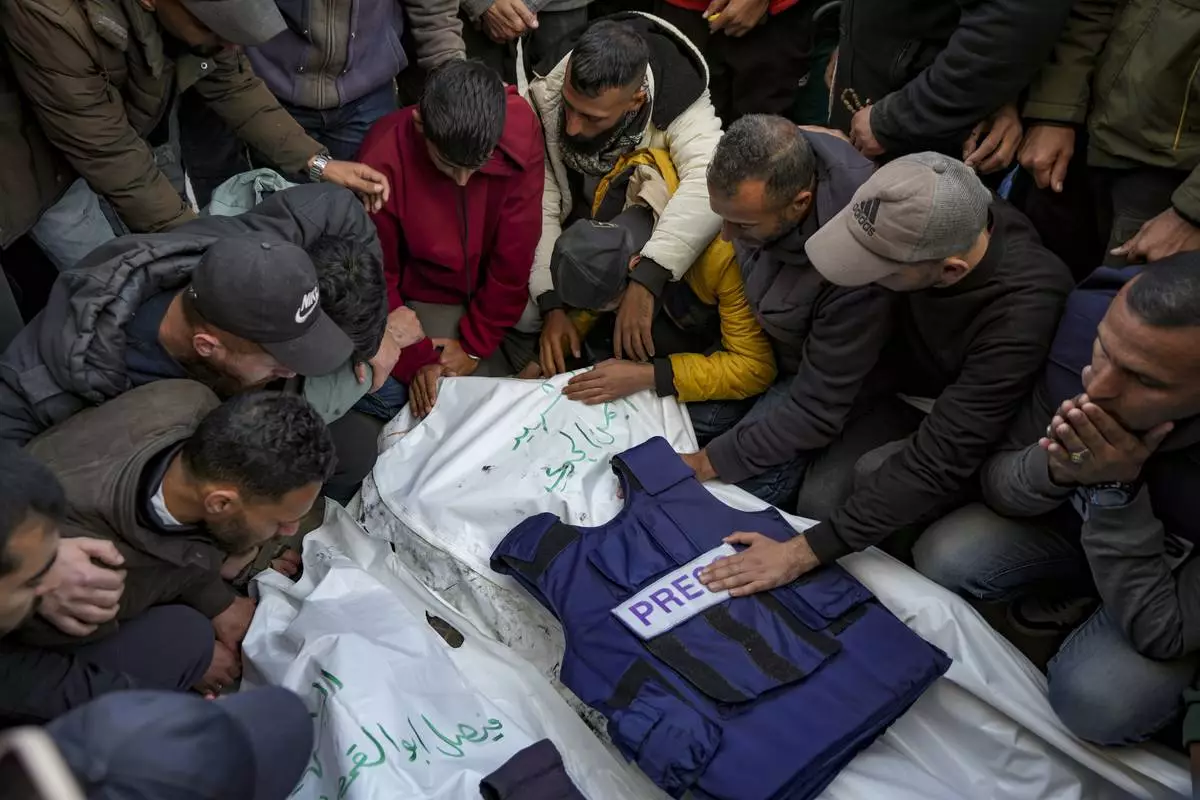
Relatives and friends mourn over the bodies of five Palestinian journalists who were killed by an Israeli airstrike in Gaza City at the Al-Aqsa Hospital in Deir al-Balah, Thursday, Dec. 26, 2024. (AP Photo/Abdel Kareem Hana)
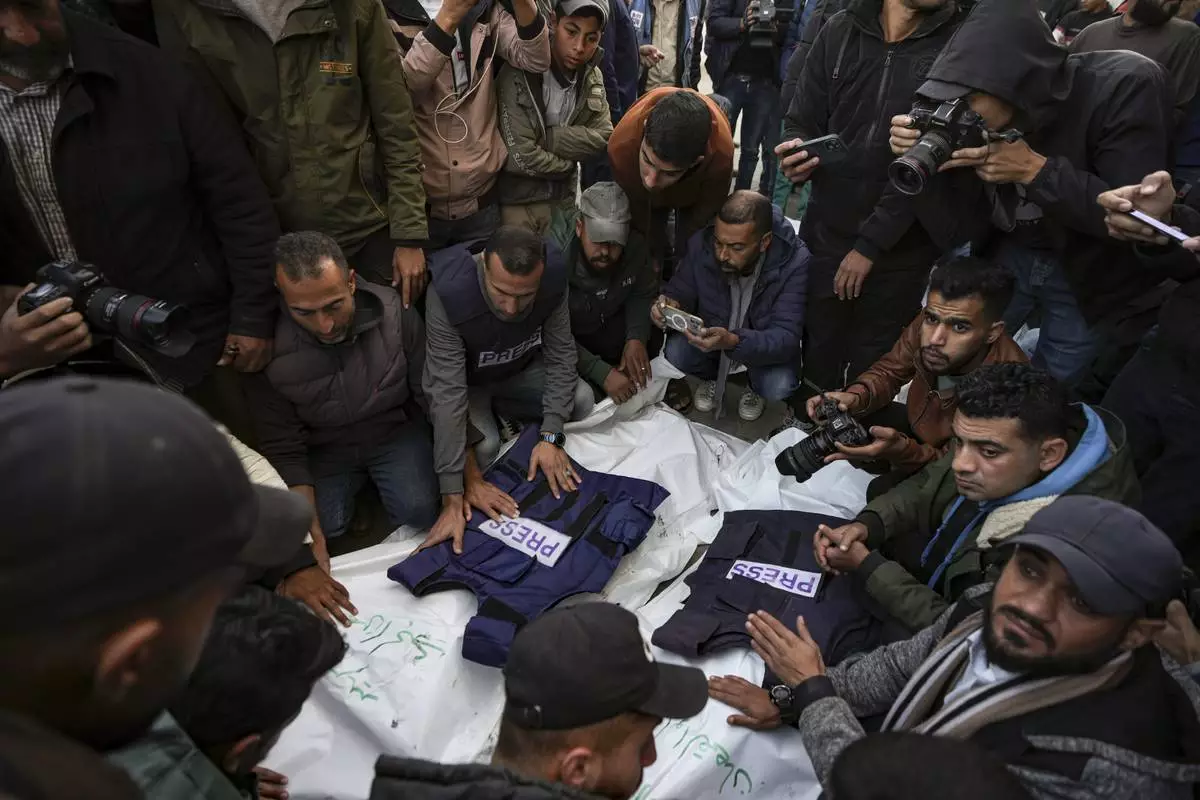
Palestinians, mostly journalists, gather around the bodies of five Palestinian journalists who were killed by an Israeli airstrike in Gaza City, at the Al-Aqsa Hospital in Deir al-Balah, Thursday, Dec. 26, 2024. (AP Photo/Abdel Kareem Hana)
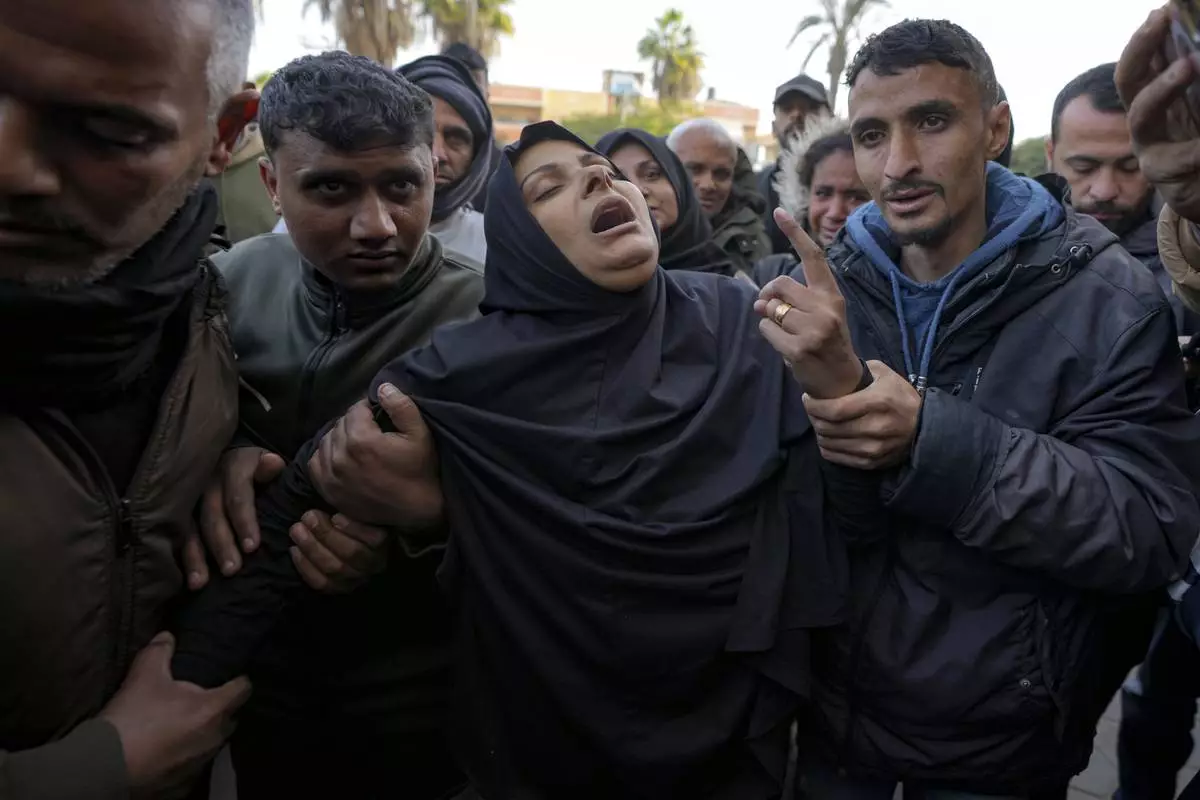
A woman reacts during the funeral of five Palestinian journalists who were killed by an Israeli airstrike in Gaza City at the Al-Aqsa Hospital in Deir al-Balah, Thursday, Dec. 26, 2024. (AP Photo/Abdel Kareem Hana)






